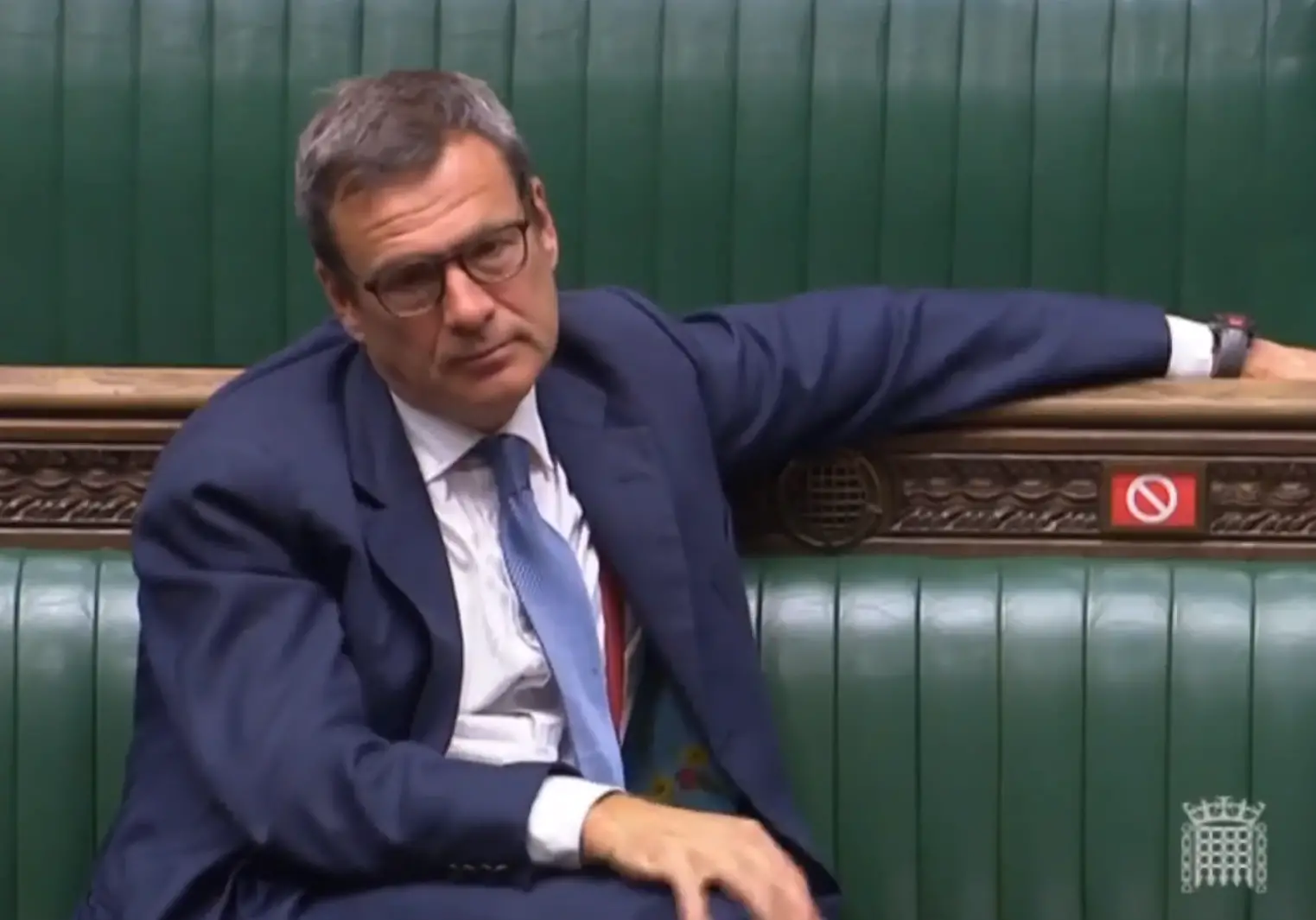A letter from the Chief Executive of UK Oil & Gas PLC (UKOG) sent to the Isle of Wight Conservative MP, claims the MP would not object to their planning application if three key conditions were met. Bob Seely refutes the claim (see below).
Stephen Sanderson has today (Thursday) written to Bob Seely (see below in full) expressing his surprise that the MP has objected to the planning application seeking permission to drill and flow test on a 25m x 25m well pad in the Arreton Valley.
In the letter, the UKOG chief says,
“We recall from our August 2019 meeting at Westminster that you mentioned you wouldn’t object to our project provided we satisfied key conditions: bring much-needed funds to the Island, ensure the proposed site was visually unobtrusive and complied with all environmental safeguarding policies.”
Mr Sanderson goes on to set out in his letter how their planning application still meets those three conditions.
Seely: “Entirely inappropriate”
Last week Bob Seely shared his objection to the planning application, which he stated would be “entirely inappropriate for the Isle of Wight”.
In his objection letter the MP said the plans would have a negative impact on the environment, increase the Island’s carbon footprint and significantly increase traffic in the area.
Meeting held after Biosphere status confirmed
Mr Seely also said the plans were visually intrusive and not in line with the commitment the Island made when it gained UNESCO Biosphere Reserve status.
However, the meeting he held with UKOG in August 2019 was already one month after the Isle of Wight had been awarded UNESCO Biosphere Reserve status.
Sanderson: Hard to understand why … is “inappropriate”
Mr Sanderson finishes his letter by saying,
“It is therefore hard to understand why such a source of indigenous oil that is temporary by nature, discretely located, plainly in line with CCC’s Net Zero plan, provides a lower greenhouse footprint oil source than imports, creates UK jobs and UK tax revenues is ‘inappropriate’.”
Seely refutes the claim
News OnTheWight contacted Bob Seely this morning to ask:
Q: He [Sanderson] says these conditions will still be fulfilled, do you disagree and therefore why have you changed your mind?
After publishing this article, Mr Seely ‘s office shared the following response,
“I have never said I would support the application. I listened to the applicant’s argument as I said I would. It is my job to represent the interests of my constituency, not those of applicants. Having now seen the submitted application I consider that the interests of the Isle of Wight are best served by this application being turned down. I am not bound by any pre-application discussions.”
Residents have until Friday 24th July to submit their comments on the Isle of Wight council’s planning portal (20/00513/FUL). The application has attracted 583 objections and 55 letters of support.
Letter from Stephen Sanderson to Bob Seely, 23rd July 2020
Dear Mr Seely,
Your recent objections to our plans at Arreton have come as a great surprise to us. We recall from our August 2019 meeting at Westminster that you mentioned you wouldn’t object to our project provided we satisfied key conditions: bring much-needed funds to the island, ensure the proposed site was visually unobtrusive and complied with all environmental safeguarding policies.
The proposed site, just off the A3056, is privately-owned and currently worked as agricultural land. It comprises a new temporary well site set back 400m from the road. Views of the site from the north, east and south are restricted by the undulating landscape and mature hedgerows that form field boundaries and highway verges. It is truly out of sight.
The wider area has the appearance of a worked landscape supporting intensive agricultural practices, large scale renewable energy installations and non-agricultural commercial uses. The land immediately to the east supports the Wight Farm Anaerobic Digestion Energy Power Station and land to the west supports the Blackwater Quarry and ancillary uses connected to the winning and working of aggregates.
In addition, we will not be causing any material traffic disruption, due to the low number of vehicle movements per day over a short temporary period. From our experience and actual data from our current mainland well sites, the number of lorries during the short drilling phase average at about 2.5 per day with a peak in the first and last week of drilling up to about 8 per day – significantly fewer than a construction site of the same size.
We would not disrupt the tourism industry on the island. As previously stated, we intend to conduct drilling operations outside the tourist season, between October and April, when, as you know, jobs on the island are in scarce supply. UKOG is very aware that tourism is a key commercial and social contributor to the Island and does not wish to add additional traffic onto the critical road network during peak season. The project’s transport management plan will of course require to be reviewed by the island’s transport authority and approved by the Council.
We will work hard to ensure the appraisal of already discovered oil is successful to be able to fulfil our promise of making significant financial contributions to Arreton and to the island as a whole. If the Isle of Wight project is successful, we will share profit with the community. We will commit to paying a percentage of any production to the local community.
We are only seeking initial permission to drill and flow test on a limited-size well pad of approximately 25m x 25m. Further, oil and gas activities are temporary by nature. Once our activities have finished at the site, we will plug the well by filling it with high grade impermeable concrete and restore the site, with the original topsoil, to green fields and trees.
Oil and gas generated from the UK meets the country’s net zero ambitions and makes a positive contribution towards our climate change targets. The overall greenhouse footprint of indigenous oil and gas is significantly less than for equivalent long distance imports. In the case of Arreton, this would be particularly so, given the short distance to the Fawley refinery across the Solent.
It makes sense for all concerned to produce our own oil and gas, regulated by the Isle of Wight Council, the Environment Agency, the Health and Safety Executive, and the Oil and Gas Authority. We cannot undertake any activities without the relevant approvals and permits from all four regulators.
Success would bring jobs, plus generate wealth and tax revenues. To rely on imports from less well-regulated countries with poor environmental standards frankly makes no sense. We have also committed to using the maximum feasible number of services and contractors from the island. Via targeted procurement of local transport, hospitality and services our operations would enhance off-season fiscal and job opportunities on the island should permissions be granted.
We are not fracking. We do not want to and do not need to because the rock formations we’re targeting are naturally fractured by Mother Nature and can flow oil and gas sufficiently well on their own. Our work uses only conventional oil field techniques as used in over 2,000 wells onshore UK.
Our well will involve drilling a small six-inch diameter hole (i.e. the size of a small domestic drainpipe) which will be lined with steel and impermeable concrete some three-quarters of a mile or more below the surface.
We would certainly not pollute the area. Just like our other sites, Arreton would be a zero-discharge site. The ground will be protected over the whole well pad area and perimeter ditches by an impermeable membrane. Any water (including rainwater) cannot penetrate below or away from the site and will be removed and disposed of at an Environment Agency approved waste facility. There will also be secondary containment protecting oil and water-based drilling fluid tanks, plus the membrane lined ditch to contain any external floodwater and other liquids within the site perimeter.
In this regard, we note that Southern Water have recently raised no objections to our application, which we feel is incredibly significant.
We will not industrialise where we operate. We select sites that are well screened and cause little or no disruption to the community and to the ecology and environment. Each site is less than the size of two football pitches. Other than the mast of a drilling rig (which is only present for around 60 days maximum), our equipment is low-rise and low visual profile, being no higher than a portacabin.
In your objection to Isle of Wight Council you dismiss our project at Arreton to be “inappropriate”. It is worth reminding you that oil continues to form a key part of the UK’s energy mix. Based on a recent document supplied by the UK oil and gas industry trade body to the Minister of State at the Department of Business, Energy and Industrial Strategy, oil provides over 40 per cent of the UK’s total energy production and oil products making up nearly half of the UK’s consumer demand in 2018.
The UK has an overall oil import dependency of 32.6% as of 2017 (198.57 million barrels) at a net cost of £3.2bn to the balance of payments.
The UK Committee on Climate Change (CCC) concluded that a demand of 407,000 barrels per day would be required in 2050. We understand that this number may also be revised upwards. This includes key non-combustion uses such as production of chemicals and medicines, products that contribute to low carbon industries such as the commodities needed to make solar panels or carbon fibre products for lightweight vehicles and aircraft where bioplastics are uneconomic or undesirable for land use reasons.
Based on Oil and Gas Authority projections for 2050 and beyond, the UK would have a net oil import dependency of circa 50% in 2050. To meet such demand the UK would have to continue to import or significantly increase the production of indigenous oil. The cost of imports at £50 a barrel would be in excess of £170 billion over 30 years.
As we have previously stated, imported oil and gas has a higher greenhouse footprint, does not create the same level of direct or indirect UK employment, which is clearly of paramount importance to the UK and the Isle of Wight, and, crucially, makes little contribution to the exchequer.
It is therefore hard to understand why such a source of indigenous oil that is temporary by nature, discretely located, plainly in line with CCC’s Net Zero plan, provides a lower greenhouse footprint oil source than imports, creates UK jobs and UK tax revenues is “inappropriate”.
If you require further information, please contact as via info@ukogplc.com.
With best wishes,
Stephen Sanderson
Chief Executive
UK Oil & Gas PLC
Article edit
12.45pm 23rd Jul 2020 – Response from Bob Seely added





